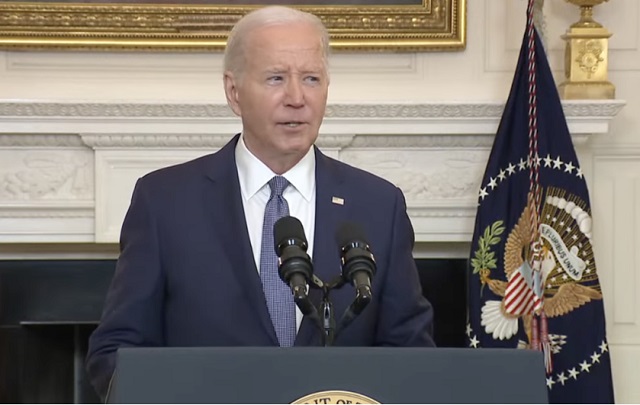From The Center Square
“It’s a shame the damage he’s done to our country. I’d love to ask him … why he allowed millions of people to come in here from prisons, jails and mental institutions to come into our country and destroy our country”
Throughout the presidential debate Thursday night, former President Donald Trump continued to interject into his responses criticisms about President Joe Biden’s border policies.
When finishing one of his first answers to a question about the economy, Trump said the U.S. had become a third world country.
“It’s a shame the damage he’s done to our country. I’d love to ask him … why he allowed millions of people to come in here from prisons, jails and mental institutions to come into our country and destroy our country,” Trump said.
When answering a question about the national debt and in response to a comment Biden made about Medicare, Trump said Biden was “destroying Medicare because all of these people are coming in [through the border and the Biden administration is] putting them on Medicare, they’re putting them on Social Security. … This man is going to single handedly destroy Social Security. These millions and millions of people coming in they’re trying to put them on Social Security,” adding that Biden “will wipe out Social Security, he will wipe out Medicare” because of the border crisis. “What this man has done is absolutely criminal.”
In response to a question about abortion, Biden referred to “the young woman who just was murdered and he went to the funeral and the idea that she was murdered by an immigrant coming in … but here’s the deal, there’s a lot of women who are raped by their in-laws, by their spouses, by their brothers and sisters … and would get arrested for crossing state lines” to have an abortion. It is unclear who Biden was referring to regarding the murdered woman or who he claims attended her funeral.
In response to his comment, Trump said, “There have been many young women who have been raped by the same people he allows to come across our border. We have a border that’s the most dangerous place anywhere in the world … and he opened it up and these killers are coming into our country and they are raping and killing women. It’s a terrible thing.”
In response to a question about how the economy is hurting Black Americans, Trump said, Biden’s “big kill on the Black people is the millions of people that he’s allowed to come in through the border. They’re taking Black jobs now,” adding that the number of illegal border crossers could be “18, 19 even 20 million people. They’re taking Black jobs, and they’re taking Hispanic jobs. You haven’t seen it yet, but you’re going to see something that’s going to be the worst in our history.”
In response to a comment related to the cost of insulin and pharmaceutical drugs, Trump said, “I’m the one who got insulin down. I’m the one who took care of the seniors. What he’s doing is destroying all of our medical programs because the migrants coming in” are being enrolled in taxpayer funded programs. He said they are “destroying our country. They’re taking over our schools, our hospitals, and they’re going to be taking over Social Security. He is destroying Social Security, Medicare and Medicaid.”
In response to efforts to keep Social Security solvent, Biden said increasing taxes on the wealthy would help and that Trump wanted to cut the program. He also said, “Americans have greater healthcare coverage today than they have ever had before.”
Trump repeated his claim multiple times that Biden “is destroying” Social Security, Medicare and Medicaid “because millions of people are pouring into our country” and the Biden administration is enrolling them into the programs and “putting them in our hospitals.” He said illegal foreign nationals were “taking the place of our citizens.” What the Biden administration is “doing to the VA, to our veterans, is unbelievable. Our veterans are living in the street and these people are living in luxury hotels. He doesn’t know what he’s doing. … I’ve never seen such anger in our country before.”
In response to Trump’s claims, Biden said, “the idea that we’re going to be in a situation where all of these millions and millions … of illegal aliens are coming into the country and taking away our jobs, there’s a reason why we have the fastest growing economy in the world … and we’re doing better than any other nation in the world,” suggesting that foreign labor was fueling the economy. Under current law, the majority of illegal foreign nationals are prohibited from gaining lawful employment. Depending on the parole program through which illegal foreign nationals were released, some are given two-year work permits. In April, the Biden administration increased automatic extensions for some employment authorizations.














